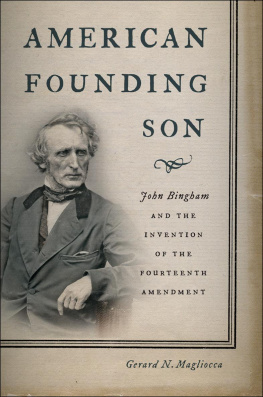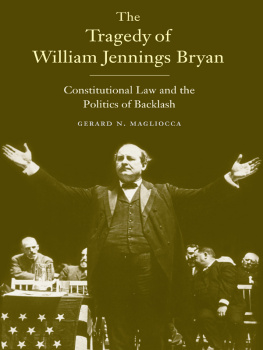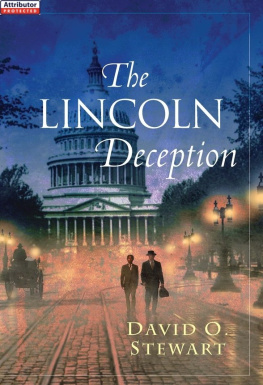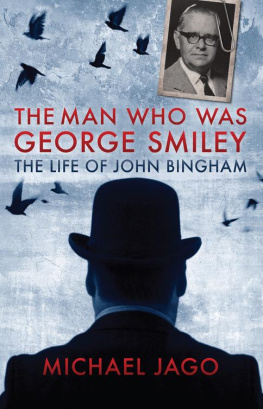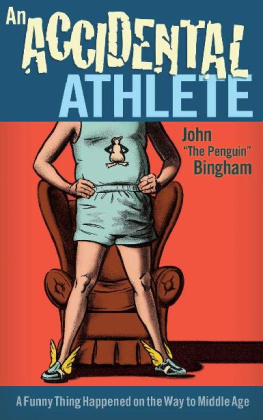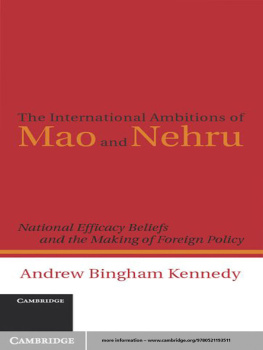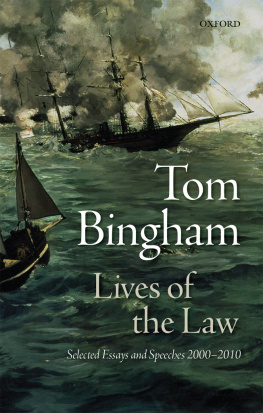Thank you for buying this ebook, published by NYU Press.
Sign up for our e-newsletters to receive information about forthcoming books, special discounts, and more!
Sign Up!
About NYU Press
A publisher of original scholarship since its founding in 1916, New York University Press Produces more than 100 new books each year, with a backlist of 3,000 titles in print. Working across the humanities and social sciences, NYU Press has award-winning lists in sociology, law, cultural and American studies, religion, American history, anthropology, politics, criminology, media and communication, literary studies, and psychology.
AMERICAN FOUNDING SON
AMERICAN FOUNDING SON
JOHN BINGHAM AND THE INVENTION OF THE FOURTEENTH AMENDMENT
Gerard N. Magliocca
NEW YORK UNIVERSITY PRESS
New York and London
www.nyupress.org
2013 by New York University
All rights reserved
References to Internet websites (URLs) were accurate at the time of writing. Neither the author nor New York University Press is responsible for URLs that may have expired or changed since the manuscript was prepared.
LIBRARY OF CONGRESS CATALOGING-IN-PUBLICATION DATA
Magliocca, Gerard N.
American founding son : John Bingham and the invention of the Fourteenth Amendment / Gerard N. Magliocca.
pages cm
Includes bibliographical references and index.
ISBN 978-0-8147-6145-8 (cl : alk. paper)
1. United States. Constitution. 14th AmendmentLegislative history. 2. African AmericansCivil rightsLegislative history.. 3. Bingham, John Armor, 1815-1900. 4. Civil rightsUnited States. 5. Equality before the lawUnited States. I. Bingham, John Armor, 1815-1900. II. Title.
KF455814th .M34 2013
328.73092dc23
[B]
2013010671
New York University Press books are printed on acid-free paper, and their binding materials are chosen for strength and durability. We strive to use environmentally responsible suppliers and materials to the greatest extent possible in publishing our books.
Book design by Marcelo Agudo
Manufactured in the United States of America
10 9 8 7 6 5 4 3 2 1
For Preeti
The Republic, sir, is in the hands of its friends, and its only safety is in the hands of its friends.
John A. Bingham, 1866
CONTENTS
ACKNOWLEDGMENTS
Every biographer should explain why it is worth spending so much time learning about somebody elses life. In my case, the answer is that John Bingham is a fascinating man who is largely unknown despite his immense contributions to law and justice. One of my most prized possessions is Binghams autograph, which I purchased from an antique shop in Chicago and had framed with his picture. His stern face looks down at me every day in my office: a vivid reminder until recently that this book was undone. In keeping with my view that a biography should be about the subject, not the author, I will now recede into the background as best I can.
Let me begin by thanking Deborah Gershenowitz, Clara Platter, Constance Grady, Alexia Traganas, and everyone at NYU Press for their support and confidence. I am also grateful to Bruce Ackerman, Jack Balkin, Randy Barnett, Josh Chafetz, David Fontana, Brian Kalt, Carlton Larson, Mike Pitts, David Stewart, Tom Shakow, Charles Wallace, Bryan Wildenthal, and the students in the Georgetown Law School Recent Books on the Constitution Seminar for reading drafts and giving me comments that shaped the final product. I owe a special debt to Richard Aynes, the greatest living authority on Bingham, who was generous with his time and wisdom. Finally, the critical eye of Carlo Andreani, an accomplished lawyer in his own right, was indispensable in clarifying my thinking.
I never could have written this book without the assistance of the staff at the libraries and archives that possess many of the sources that I consulted. Consequently, I want to pay tribute to the Abraham Lincoln Presidential Library, the Franklin College Museum, the Harrison County Historical Society, the Historical Society of Pennsylvania, the J. P. Morgan Library, the Library of Congress, the Massachusetts Historical Society, the National Archives, the Ohio Historical Society, and the Rutherford B. Hayes Presidential Center. Many individual volunteers in Ohio, particularly Ray Ferrell, Scott Pendleton, and Charles Wallace, helped me find crucial items and deserve recognition for keeping Binghams memory alive. At my law school, Debra Denslaw did an amazing job of locating other sources and photos, and John Higgins, my research assistant, took on the thankless but essential task of getting every statement that Bingham made on the floor of the House of Representatives. He deserves a medal.
Last but not least, I salute my colleagues at the Indiana University Robert H. McKinney School of Law, whose friendship and encouragement inspire my work. And to my family and friends who have patiently endured my Bingham obsession for the past few years, this is what all of the fuss was about.
INTRODUCTION
Measuring a Man
No biography of Bingham has ever been written and perhaps none ever will be. It is too late now. He has been in his grave for many years. Those who knew him intimately and watched his public career and were received into his confidence are all gone. His family are scattered and his books and papers. All authentic records too are gone, save of some of his speeches in Congress, and a few others. So there is little encouragement for anyone to attempt a life. Besides those who would purchase such a book are gone too. There could be now little inducement for the preparation of such a life.
Walter Gaston Shotwell, 1927
Americans are of two minds about their past. When the subject is military history, the Civil War holds a special place in our national life. When it comes to political and legal history, the Founding Fathers and the birth of the Constitution are sacred. Most people know who Robert E. Lee and Alexander Hamilton were and want to learn more about them. Turn this pairing around, however, and a strange thing happens. Interest in the Revolutionary War is less common: George Washington is the only general who stands out. Likewise, the politicians who led the Civil War are largely unknown, except for Abraham Lincoln. This indifference to the civil side of the Civil War is unfortunate because the Confederacys defeat led to constitutional changes that were as profound as the ones launched in Philadelphia after our first civil war between royalists and patriots.
The most striking example of neglect with respect to our Founding Sons is Congressman John Bingham of Ohio. In 1866, Bingham wrote the following language that became part of Section One of the Fourteenth Amendment to the Constitution:
No state shall make or enforce any law which shall abridge the privileges or immunities of citizens of the United States; nor shall any state deprive any person of life, liberty, or property, without due process of law; nor deny to any person within its jurisdiction the equal protection of the laws.
This is the most important sentence in the Constitution. It is the language that the Supreme Court used to desegregate the public schools, end discrimination against women, establish equal voting rights, and find the right to sexual privacy.

